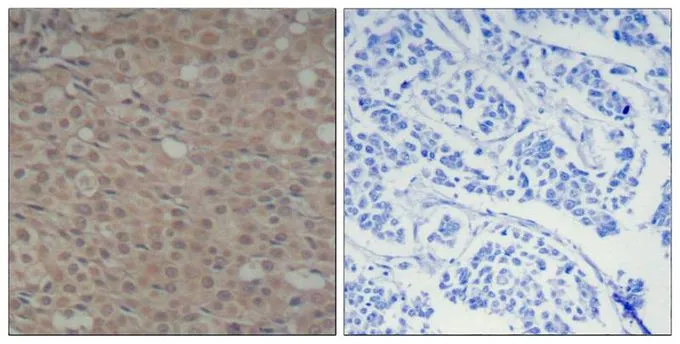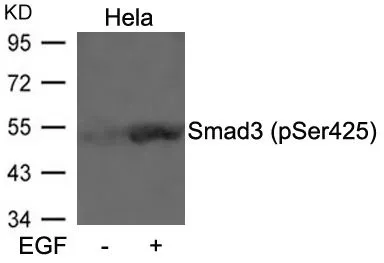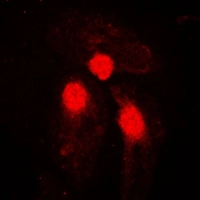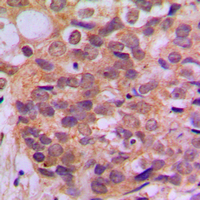
IHC-P analysis of human breast carcinoma tissue using GTX50333 SMAD3 (phospho Ser425) antibody. Left : Primary antibody Right : Primary antibody pre-incubated with the antigen specific peptide
SMAD3 (phospho Ser425) antibody
GTX50333
ApplicationsWestern Blot, ImmunoHistoChemistry, ImmunoHistoChemistry Paraffin
Product group Antibodies
TargetSMAD3
Overview
- SupplierGeneTex
- Product NameSMAD3 (phospho Ser425) antibody
- Delivery Days Customer9
- Application Supplier NoteWB: 1:500-1:1000. IHC-P: 1:50-1:100. *Optimal dilutions/concentrations should be determined by the researcher.Not tested in other applications.
- ApplicationsWestern Blot, ImmunoHistoChemistry, ImmunoHistoChemistry Paraffin
- CertificationResearch Use Only
- ClonalityPolyclonal
- Concentration1 mg/ml
- ConjugateUnconjugated
- Gene ID4088
- Target nameSMAD3
- Target descriptionSMAD family member 3
- Target synonymshMAD-3; hSMAD3; HSPC193; HsT17436; JV15-2; LDS1C; LDS3; MAD homolog 3; mad homolog JV15-2; mad protein homolog; MAD, mothers against decapentaplegic homolog 3; mad3; MADH3; mothers against decapentaplegic homolog 3; mothers against DPP homolog 3; SMA- and MAD-related protein 3; SMAD, mothers against DPP homolog 3
- HostRabbit
- IsotypeIgG
- Protein IDP84022
- Protein NameMothers against decapentaplegic homolog 3
- Scientific DescriptionThe protein encoded by this gene belongs to the SMAD, a family of proteins similar to the gene products of the Drosophila gene mothers against decapentaplegic (Mad) and the C. elegans gene Sma. SMAD proteins are signal transducers and transcriptional modulators that mediate multiple signaling pathways. This protein functions as a transcriptional modulator activated by transforming growth factor-beta and is thought to play a role in the regulation of carcinogenesis. [provided by RefSeq, Apr 2009]
- Storage Instruction-20°C or -80°C,2°C to 8°C
- UNSPSC12352203


![IHC-P analysis of rat brain tissue section using GTX00969 SMAD3 (phospho Ser423/Ser425) antibody [GT1207]. Dilution : 1:100](https://www.genetex.com/upload/website/prouct_img/normal/GTX00969/GTX00969_20200327_IHC-P_35_w_23053121_917.webp)
![ICC/IF analysis of NIH3T3 cells using GTX82809 SMAD3 antibody [5G11]. Green : SMAD3 Blue: DRAQ5 fluorescent DNA dye Red: Actin filaments](https://www.genetex.com/upload/website/prouct_img/normal/GTX82809/GTX82809_20170912_ICCIF_w_23061322_618.webp)
![IHC-P analysis of human colon carcinoma tissue using GTX34208 SMAD3 antibody [8B5]. Dilution : 1:200](https://www.genetex.com/upload/website/prouct_img/normal/GTX34208/GTX34208_20200622_IHC-P_304_w_23060801_883.webp)
![IHC-P analysis of human breast carcinoma tissue using GTX34209 SMAD3 antibody [1E8]. Dilution : 1:200](https://www.genetex.com/upload/website/prouct_img/normal/GTX34209/GTX34209_20200622_IHC-P_283_w_23060801_950.webp)

